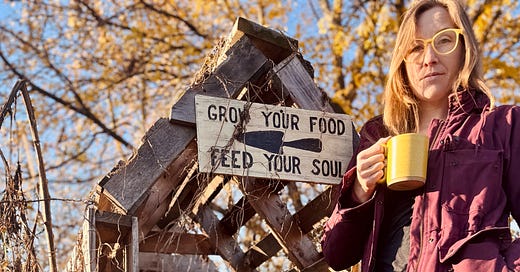You’d think that a holiday all about food would be my favorite. But I’ve always kind of hated Thanksgiving. I never loved the meal itself and it was always such a production. I could never put my finger on why I disliked this holiday though. I started to enjoy it more when I went vegan and the food got a little brighter, greener and more creative, but I still didn’t like it. I mean, everything is typically so beige.
It’s the one time of the year when everyone in the US is eating seasonally. Of course, most of us are using processed canned, boxed or frozen foods, so I’m not sure it even counts. It feels so ignorant for us to flock to grocery stores for these foods when this meal is about connecting with our community, not just our families. Of course there is a lot of hypocrisy and ignorance in this holiday that allow us to continue to celebrate it and that’s not what this post is about.
Abundance…
Abundance is a word we hear a lot when it comes to homesteading. I’ve been known to use it to describe August, when the dining room table is covered in tomatoes, herbs cover every hook to dry, and there’s onions and garlic curing on every surface. The more subtle, and more important, lesson of abundance that homesteading provides is in choosing to go without.
We’ve got supermarkets within a few miles of our houses, two day shipping available at our fingertips, and access to a global food source. Abundance. Drive by any thrift store, especially the week after Christmas, and you see the kind of abundance we live in. Empty, materialistic, temporary abundance.
The stuff we cannot resist purchasing is easily forgotten on the curb of our asphalt meadow. The things we buy for our loved ones out of an obligation born from capitalism are returned or forgotten. We fill our pantry using coupons for packaged foods and call our neighbors to tell them about the deal. We tear down houses and barns and fields that grow food to fill them with concrete and glass. We’re constantly searching, buying, adding, never content.
The type of abundance that homesteading provides is full. Full of hard work. Full of creative solutions. Full of love and pride.
Homesteading has rewired my brain to search my belongings, skills and the land before rushing to make immediate purchases for the things I need or long for. Homesteading has taught me to eat with the seasons. It has taught me to have reverence for the things I consume, especially those I purchase. I know that a deal often comes with unseen consequences. Food miles, underpaid labor, lack of fair trade, or stale and long ago harvested ingredients. Instead of abundance as a state I constantly seek, abundance is now woven into the fabric of my life. It changes with the seasons.
In the winter we have an abundance of leaves so that in the spring we have an abundance of soil so that in the summer we have an abundance of flowers so that in the fall we have an abundance of seeds.
Abundance is (an incomplete list)
Vegetables picked at their peak season
A pantry of home canned goods
Finding what you need in your size at the thrift store
Hand me downs
Mushrooms after a good rain
Wild yeast
Maple syrup
Products imbued with the reverence of their maker
When we purchase things, they tend to last forever despite often being discarded. It’s the feeling we get from them that’s temporary. But a berry bush that grows wild with no input from you at all fills your basket once a year is temporary. You can walk that same path daily for a year and only fill your basket with juicy berries 20 of those days. It’s the feeling that will be everlasting. Every day those berries will provide you with reverence.
This is not a post about perfection. I sometimes read things like this and instead of taking action I fall into a trap of feeling bad about myself and my behavior. That’s the last thing I want. I’m far from perfect. My family has and uses an Amazon membership. I sometimes forget these lessons of homesteading, which is why I come here to write them down. If this post resonated with you, you’re probably thinking you can do better. We all can. I can. These are some of the simple techniques and questions I use to limit consumption and live in a more natural state of abundance:
Keep items in your cart for 24 hours before purchasing
Ask, can I find this second hand?
Ask, is this motivated by emotion or need?
Ask, is this for a single use? Are there multi-use options?
Ask, do I have something that I can repurpose?
Ask, can I go without?






